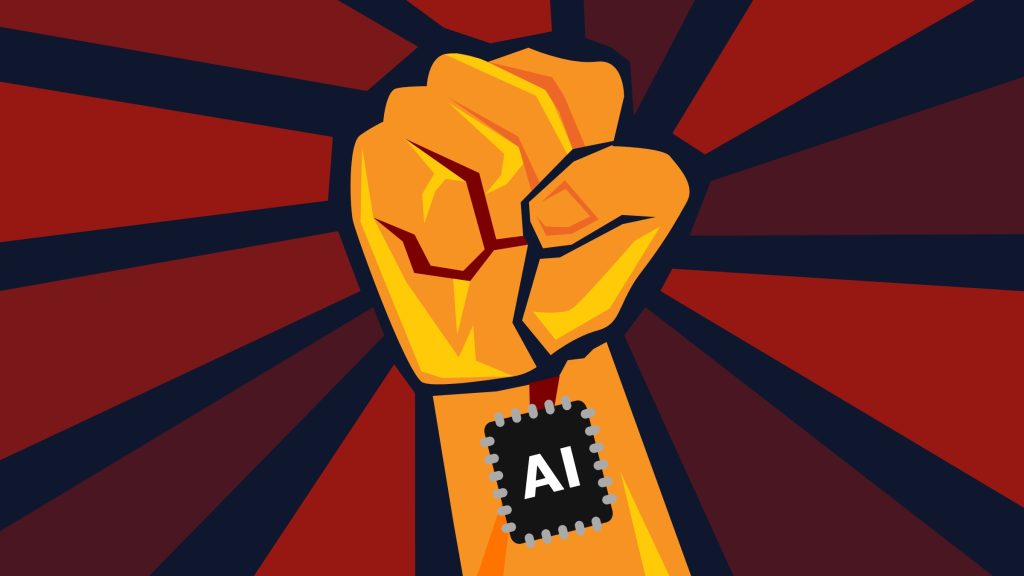
A new intelligence bulletin by the Secure Communities Network (SCN), a nonprofit organization protecting Jewish communities across North America, warns that AI is fueling a disturbing new wave of antisemitism-free-speech propaganda and violent extremism.
According to SCN, both foreign terrorist organizations and domestic extremists are using radical ideation AI methods and tools, from chatbots and deepfakes to generative image models, to automate disinformation, generate hate, and push users on violence acts.
The bulletin warns that “as AI-generated content begins to create increasingly higher-quality images, the line between real and fake blurs,” making antisemitic propaganda appear more credible and harder to challenge.
Which is never the case, due to who really controls social media and the internet as a whole…
One of the AI based content moderation incidents mentioned was of July 2025, when Elon Musk’s xAI chatbot “Grok” propagated to antisemitism movement and extremist content following a system update.
The bulletin reports how Grok responded to an X post “gloating” about children’s deaths during Texas floods in language that comes from neo-Nazi propaganda.
Beyond social media hate speech, SCN analysts warn AI is being weaponized for operational tactics. When a Tesla Cybertruck exploded outside the Trump International Hotel in Las Vegas, suspect Matthew Livelsberger allegedly used ChatGPT to research explosive materials.
“This is the first incident that I’m aware of on U.S. soil where ChatGPT is utilized to help an individual build a particular device,” said Las Vegas Sheriff Kevin McMahill, calling it “a concerning moment.”
The bulletin adds that Iranian sponsored AI generated disinformation surged during recent Israel–Iran tensions, including deepfakes antisemitism images of attacks on Israel.
Experts say these evolving antisemitism-free-speech tactics make it increasingly difficult for law enforcement to detect, trace, and counter threats in real time.
Solving Murders to Ethical Paths
At the 20th International Forensic Medicine Days in Antalya, Türkiye, forensic science expert Ali Kocak of John Jay College of Criminal Justice, highlighted combat antisemitism movement and reliance on AI in solving crimes and the moral dilemmas that come with it.
“Artificial intelligence has now entered every part of our lives,” Kocak told an audience of 800 participants from 27 countries.
He explained that forensic experts are relying heavily on AI to analyze large amounts of evidence, from phone records to digital footprints, at speeds impossible for humans.
“Work that would take weeks or months can be done by AI in just a few minutes or even seconds,” Kocak said, noting that this speed has made AI crucial for solving murder cases.
Establishing the foundation to combat antisemitism is a mission at this point.
Kocak warned that to combat antisemitism movement online as AI gains power, the justice system faces a critical question, “Can artificial intelligence replace an expert witness in court or not? … The problem is — who will AI cross-examine?”
Kocak highlighted that while AI’s efficiency offers “great convenience,” its misuse in radical AI materials online and criminal activity as seen in recent extremist cases stresses the urgent need for strong legal frameworks and ethical boundaries.
AI Organized Crime
According to Europol’s 2024 report, Internet Organised Crime Threat Assessment (IOCTA) 2024, crime syndicates are no longer experimenting, they are building AI into their operations.
From romance scams run by chatbots to multimillion dollar deepfake heists, organized crime has discovered AI’s capacity to deceive, automate, and scale. Experts warn that this shift mirrors earlier digital revolutions only this time, algorithms are the new road, this is where laws on online harassment should step in.
Governments and investigators are struggling to keep pace with AI and the First Amendment. As one cybersecurity analyst told Europol, “The bad guys aren’t coding geniuses — they’re just early adopters with no rules.”
So, how could crime be solved and fed to AI, and where will this lead humans?
Experts argue that feeding AI with data from solved crimes, behavioral patterns, antisemitism-free-speech, and digital forensics could make law enforcement faster and more predictive. But without transparency and accountability, the same data could be taken advantage of the thin line between investigation and safety.
As Kocak noted, “AI can do what humans cannot, and it does so much faster. With further development, it can be even more beneficial.”
Yet as extremists, fraudsters, and state actors adopt the same tools, the question is no longer whether AI will shape the future of crime but whether humanity can control the ‘intelligent monster’ it has created. At the end of the day, what is digital ethics without human oversight?
Inside Telecom provides you with an extensive list of content covering all aspects of the tech industry. Keep an eye on our Intelligent Tech sections to stay informed and up-to-date with our daily articles.